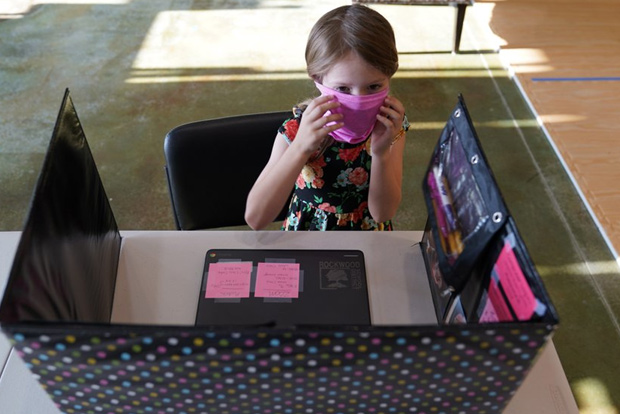Begin typing your search...
Adaptation in crisis: Virtual learning sites sprout to help working parents
A dance studio in Florida. A martial arts center in Missouri. Libraries in San Francisco. These and other places are taking on a somewhat unlikely new role this fall — welcoming children for supervised distance learning while their parents go to work.

Chennai
With many schools still closed by the coronavirus pandemic, public and private alternatives are sprouting up across the nation to watch over children as they study. The sites provide a lifeline for families that struggled through virtual learning last spring, but organisers acknowledge they are a poor substitute for schools with professional educators. And by inviting students to congregate in new spaces, experts say, the programmes risk subjecting caregivers to the same virus dangers that closed schools.
“It’s creating the same situation as we would for having the children in school,” said Florida International University epidemiologist Dr. Aileen Marty. “So the only way that works is if you know everybody in that group, a very small group, and everyone is tested and tested negative.”
When schools in Broward County, Florida, announced plans to begin the new year with remote learning, dance studio owner Katie Goughan recognised immediately the challenges for working parents. Her Dance Explosion Co. in Hollywood, Florida, has hired a substitute teacher who is on site from 7 a.m. to 3 p.m. to keep students on task. The studio is charging $150 a week, or a daily rate of $35.
“I thought to myself, ‘What would my parents have done with me?’” Goughan said. “I wanted to alleviate any stress that parents might be under right now trying to find somewhere for their kids to do their school-work.” The studio, which has capacity for 30 students, currently has 10 children during the day, all of them wearing masks, along with temperature checks and lots of hand sanitiser.
Jennifer Quisenberry, 37, a nurse practitioner, is sending her 6-year-old daughter, Audra, to a “distance learning camp” at Premier Martial Arts in Wildwood, Missouri. Her daughter’s district is beginning the year virtually, and she and her husband, who works for a car dealership, have struggled with child care since schools closed. With no family available to help, she had trouble sleeping before finding the martial arts center, which is owned by a former high school teacher.
“We can’t not come to work,” she said. “My partners said I could bring Audra to work. But a hospital is not an ideal setting for a 6-year-old in the middle of a pandemic.” While affluent parents turn to “ learning pods ” and private tutors, many of the arrangements set up by non-profits and local governments are designed with low-income families in mind.
In Philadelphia, city officials announced Thursday that they would open 31 drop-off sites at community centers, housing authority properties and libraries for parents who need someone to supervise children attending virtual classes. The programme will focus on families with the greatest need, including those who cannot afford child care and those who do not have internet access at home.
San Francisco is creating “community learning hubs” at 40 sites across the city to assist with distance learning for children who are poor, homeless, in foster care or learning English as a second language.
In Kansas City, Missouri, the parks department is working with the Boys and Girls Club and the group Camp Fire Heartland to offer virtual learning to hundreds of students. For participants from Kansas City Public Schools, the city’s poorest district, the programme is free. “It is tough for parents with school-aged children who are too old to go to preschool, and hiring a babysitter or nanny is not an option for their finances,” said Roosevelt Lyons, deputy director of operations for the parks department. In Orlando, which is hosting distance-learning programmes at community centers citywide, families will pay just $5 a day or nothing if they qualify for government-subsidised lunches.
Associated Press
Visit news.dtnext.in to explore our interactive epaper!
Download the DT Next app for more exciting features!
Click here for iOS
Click here for Android
Next Story



